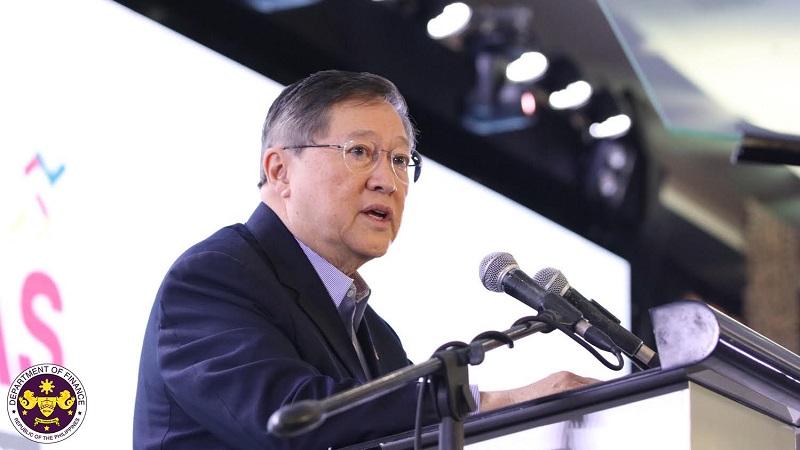Philippines striking ‘delicate balance’ between support to economy, debt sustainability — DOF’s Dominguez

The Philippines is committed to continue striking a “delicate balance” between providing substantial support to the economy and keeping its policy of long-term debt sustainability in its battle against, and eventual recovery from the lingering COVID-19 pandemic, Finance Secretary Carlos Dominguez III said Thursday.
In his remarks during the virtual economic briefing themed “Philippines-United States at 75: Strengthening Ties through Sustainable Recovery,” Dominguez said that despite the challenges of the pandemic, the government was able to allow “a temporary but controlled expansion” of the Philippines’ deficit-to-gross domestic product (GDP) ratio to 7.6% last year, keep a fiscally viable debt-to-GDP ratio of 54.5%, and sustain its accelerated spending on the “Build, Build, Build” infrastructure program, which is expected to increase to more than 5% of the country’s GDP until the end of President Duterte’s term.
“In this battle against COVID-19, we are committed to continue striking a delicate balance between providing substantial support to the economy and maintaining our policy of long-term debt sustainability,” the Finance chief said.
“Even with the unprecedented crisis, the Duterte administration will continue to work hard until the last minute of its term to undertake the reforms we had set out to do in our zero-to-ten-point socioeconomic agenda,” he said.
“We will make sure that these measures will be irreversible and will form the foundation of an inclusive, sustainable and investment-driven economy for the Filipino people,” he added.
The Finance chief said the Duterte administration was also able to stick to its socioeconomic reform agenda despite the ongoing pandemic, as shown by the recent enactment of the Corporate Recovery and Tax Incentives for Enterprises (CREATE) Act, which makes its comprehensive tax reform program (CTRP) nearly complete.
“Through CREATE, we see an opportunity to deepen our trade and investment partnership with the United States by incentivizing industries with higher value-added activities,” Dominguez said.
CREATE lowers the Philippines’ corporate income tax (CIT) rate from 30% to 20% for micro, small and medium enterprises (MSMEs) and to 25% for all other firms, while providing an improved incentives package that is performance-based, time-bound, targeted and transparent.
“I would like to emphasize that the President did not just sign CREATE into law but he vetoed nine items to ensure that it would serve its purpose as a tax relief measure and as an effective instrument in modernizing our fiscal incentives system. At this late stage, we have again demonstrated the administration’s commitment to make tax reform a real game-changer,” Dominguez said.
On possible concerns over the Philippines’ COVID-19 cases, the Finance chief said that while the recent spike of infections in the country might appear accelerated, these are nowhere the levels experienced by other countries, which have far higher death rates of 150 per one hundred thousand of their populations.
The Philippines' COVID-19 fatality rate is roughly 14 people per hundred thousand of its population.
“Despite supply challenges, we are fully rolling out our vaccination program. Our target is to inoculate at least 70 million Filipinos or 100 percent of our adult population within the year. We have arranged for the delivery of more than 140 million doses of COVID-19 vaccines this year. About 15 percent will be delivered in the first half of this year and 85 percent in the second half," Dominguez said.
Dominguez said majority of the financing needed for the country’s vaccination program was sourced through loans from the World Bank (WB), Asian Development Bank (ADB) and Asian Infrastructure Investment Bank (AIIB) to assure the public that: “First, that the vaccines we are buying are internationally accepted, and have passed the stringent criteria for safety and effectiveness. Second, that the vaccine procurement is totally transparent.”
“I would also like to point out that the trilateral cooperation among the three multilateral banks in support of the Philippines’ vaccination program is a first in the ASEAN (Association of Southeast Asian Nations) region,” he said.
He said that to fully liberalize the Philippine economy, the Duterte administration will continue to push for the amendments to the Foreign Investments Act (FIA), Public Service Act (PSA) and Retail Trade Liberalization Act (RTLA), which were all certified by the President as urgent.
“The move will help speed up the approval of these measures within the President's term,” Dominguez said of the proposed amendments, which President Duterte certified this week as priority bills for congressional approval. — RSJ, GMA News



